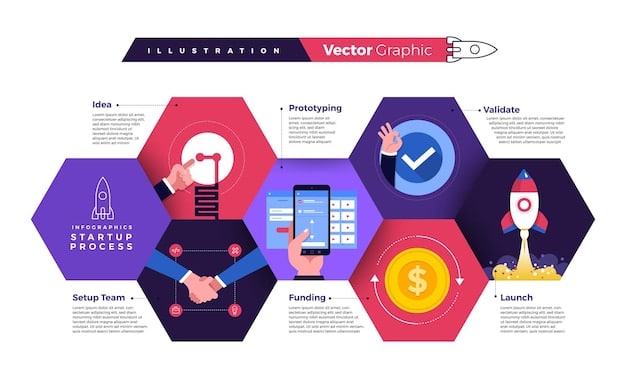How New FCC AI Regulations in 2025 Will Impact US Tech Startups

How Will the New FCC Regulations on AI Impact US Tech Startups in 2025? The FCC’s forthcoming AI regulations are poised to reshape the landscape for US tech startups, influencing innovation, compliance costs, and market access in significant ways.
The tech industry is rapidly evolving, and with it comes the need for regulatory frameworks that can keep pace. One area of particular focus is artificial intelligence (AI), and the Federal Communications Commission (FCC) is expected to introduce new regulations impacting its use. The central question many US tech startups are asking is: how will the new FCC regulations on AI impact US tech startups in 2025?
Understanding these potential changes is crucial for startups to navigate the evolving regulatory landscape and strategically plan for the future. This article delves into the likely impacts of these regulations, providing insights to help startups prepare and adapt.
Understanding the Impending FCC Regulations on AI
Before diving into the specific impacts, it’s important to understand the context of the impending FCC regulations on AI. These regulations are likely to address issues such as data privacy, algorithmic bias, and transparency in AI applications. The specific details of these regulations are still under development, but their broad goals are to ensure that AI is used responsibly and ethically.
Key Areas of Regulatory Focus
The FCC’s focus on AI regulations is expected to center on a few core areas. These include:
- Data Privacy: Regulations may require AI systems to protect user data and provide greater transparency about how data is collected, used, and stored.
- Algorithmic Bias: The FCC will likely address concerns about AI systems perpetuating or amplifying existing biases, requiring startups to develop strategies for mitigating these biases.
- Transparency: Startups may need to provide clear explanations of how their AI systems work and how they make decisions.
- Accountability: Establishing clear lines of accountability for the actions and decisions made by AI systems will be crucial.
These areas of focus will collectively shape how startups develop and deploy AI technologies, influencing everything from product design to compliance protocols.

Understanding the groundwork for these regulations is the first step in preparing for the changes. The next step is to recognize how these regulations will likely affect specific aspects of startup operations.
The Impact on Innovation and Development
One of the most significant questions is, how will the new FCC regulations on AI impact US tech startups in 2025 in terms of innovation? While regulations often spark fears of stifled creativity, they can also spur innovation in responsible AI development.
Potential Benefits
The regulatory framework may actually drive startups to develop more robust, transparent, and ethical AI systems. This could lead to a competitive edge as consumers and businesses increasingly demand responsible AI solutions.
- Increased Trust: Compliance with regulations can enhance user trust in AI products and services.
- Competitive Advantage: Startups that prioritize ethical AI can differentiate themselves in the market.
- Sustainable Growth: Building responsible AI practices from the outset can lead to more sustainable and ethical growth.
However, the path to innovation is not without its challenges, and startups need to prepare for the potential hurdles involved.
Potential Challenges
On the other hand, compliance with new regulations can require significant investments in resources and expertise. This could disproportionately affect smaller startups with limited budgets.
These potential challenges mean startups will need to think strategically about how they allocate resources and adapt their development processes.
The impact on innovation will depend on how well startups can balance regulatory compliance with their existing innovative processes, and the next section will look at how they can prepare for this.
Preparing for Compliance: A Strategic Approach
Proactive preparation is key to mitigating the challenges posed by the new FCC regulations. How will the new FCC regulations on AI impact US tech startups in 2025 in this area? Startups can take several strategic steps:
Invest in Compliance Expertise
Startups should consider hiring or consulting with experts in AI ethics, law, and compliance to ensure they are well-versed in the regulatory requirements.
Develop Robust Data Governance Frameworks
Implementing strong data governance practices, including data privacy policies and data security measures, is essential. This includes clearly defining how customer data is collected, stored, and used.
Foster Transparency and Explainability
Startups should aim to build AI systems that are transparent and explainable, providing users with insights into how decisions are made. Tools and techniques such as explainable AI (XAI) can be invaluable in achieving this.

Embracing these strategies early can help startups navigate the complex regulatory landscape and avoid costly compliance failures. But what about the financial implications of these new regulations?
The Financial Implications for Tech Startups
The financial implications of the new FCC regulations on AI can be significant for tech startups. How will the new FCC regulations on AI impact US tech startups in 2025 in terms of costs? Compliance costs can include legal fees, consulting fees, and the expenses associated with implementing new data governance and transparency measures. These costs may strain the limited resources of startups, affecting their financial stability.
Exploring Funding Opportunities
To alleviate these financial pressures, startups can explore various funding opportunities:
- Government Grants: Look for government grants specifically targeted at promoting responsible AI development and compliance.
- Venture Capital: Seek out venture capital firms that prioritize ethical and responsible AI investments.
- Partnerships: Collaborate with larger organizations to share the costs and expertise associated with compliance.
These funding strategies can help startups mitigate the financial burden of compliance and maintain their focus on innovation. However, the long-term impact on market access is also a factor to consider.
Market Access and Competitive Dynamics
The new FCC regulations on AI will also impact market access and competitive dynamics for US tech startups. How will the new FCC regulations on AI impact US tech startups in 2025 in the market? Compliance with regulations can serve as a barrier to entry, especially for smaller startups that struggle to meet the requirements.
Global Expansion Considerations
Startups should consider how these regulations align with international standards. Compliance with US regulations can provide a competitive advantage when expanding into markets with similar regulatory frameworks, such as the European Union or Canada.
By understanding how these factors intersect, startups can position themselves strategically in the evolving AI marketplace.
Adapting Business Models for the Future
The final question is how will the new FCC regulations on AI impact US tech startups in 2025 in terms of their fundamental business models? Startups that embrace ethical AI can differentiate themselves in the marketplace. Models that prioritize data privacy and transparency can attract customers and partners seeking trustworthy AI solutions.
Continuous Monitoring and Adaptation
Ongoing evaluation of business strategies will be crucial to ensure they remain aligned with regulatory demands and market trends. Creating AI advisory boards and engaging with stakeholders can provide useful insights and direction.
Adjusting business models to accommodate regulatory rules will be essential for firms to succeed in the changing AI scene. By accepting these improvements and upholding ethical values, businesses may develop confidence with consumers, stimulate innovations, and guarantee future expansion.
| Key Point | Brief Description |
|---|---|
| 💡Regulatory Focus | FCC AI regulations will likely cover data privacy, bias, transparency. |
| 🛡️Compliance Costs | Startups face costs for legal, consulting, data governance implementation. |
| 📈Market Access | Compliance can be a barrier but also a competitive advantage for expansion. |
| 💼Adapting Models | Ethical AI models can differentiate startups, attracting trust and partnerships. |
Frequently Asked Questions
The FCC’s regulations will primarily focus on data privacy, algorithmic bias, transparency, and accountability in AI applications, aiming to ensure responsible and ethical AI usage in the US tech sector.
Startups can mitigate costs by exploring government grants, securing venture capital from firms focused on ethical AI, and forming partnerships with larger organizations to share compliance expenses.
These regulations will reshape how startups innovate, develop products, and access markets. Those that prioritize ethical and transparent AI practices will gain competitive advantages.
Transparency is crucial. Startups must explain how AI systems work and make decisions, increasing user trust and adherence to regulatory standards.
Yes, complying with US AI regulations can facilitate expansion into markets with similar regulations, such as those in the EU and Canada, providing a strategic advantage.
Conclusion
In conclusion, how will the new FCC regulations on AI impact US tech startups in 2025? The answer lies in proactive preparation, strategic adaptation, and a commitment to ethical AI practices. The new regulations will bring both challenges and opportunities, but by embracing responsible AI development, startups can navigate the regulatory landscape and position themselves for long-term success.
By understanding, preparing, and innovating, US tech startups can turn regulatory hurdles into a pathway for success in the ever-evolving AI industry.





